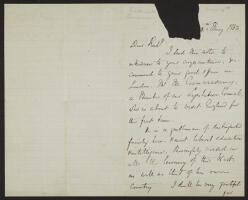CA/9/2: Including letter from Augustus Stafford O'Brien to Charles Justin MacCarthy, [11 Nov. 1835 or later]
CA/9/4: Including letter (cancelled note) from Robert Oxley to Richard Monckton Milnes, [1837?]
CA/9/2: Including letter from Augustus Stafford O'Brien to Charles Justin MacCarthy, [10/11] Dec. 1837
Letters to Richard Monckton Milnes from: Charles Justin MacCarthy; Henry George Grey, 3rd Earl Grey; others, 1846-1850. Notes by G. B. M. Mathews on his dispute with John McCannon Trew, Archdeacon of the Bahamas [c 1846?]. Notes on Mathew's second marriage, [early 1870s].
With a few letters from other members of the MacCarthy family.
Letters from: [?] Emmanuel, 1 Sept. 1836; C. de Coux, 4 Jun. 1833; Kenelm H. Digby, 15 Jun. 1833; Abbé de Lamennais, 9 Dec. 1832; R. C. Trench, 17 Jul. 1855.
6 Imperial Square, Cheltenham. - Is son of the late Thomas Slater of Liverpool, a relative of Milnes' grandfather. Requests letters of introduction for Vienna and Nice; met Mr Mcarty [sic: MacCarthy?] in Paris in 1837-1838, who lent him Milnes' poems.
Includes five letters received by Charles Justin MacCarthy, and seventeen letters to Richard Monckton Milnes concerning MacCarthy's affairs. Also a letter from Friedrich Windischmann to Milnes, 6 Jun. 1837 (in German) at HOUG/CB/250/6/4.
Verses in several hands. Authors are not given, but are as follows:
Milnes: The Complaint of Glenquoich [On headed notepaper for Invergarry, N.B.],
Landor: Foesulian Idyl [sic: actually Fæsulan Idyl]; To Tacaea; The Maid's Lament; 'When Helen first saw wrinkles in her face' [Wrinkles]; 'Say ye, that years roll on & ne'er return?' [To the Comtesse de Molande, about to marry the Duc de Luxembourg]; Friends; On Southey's Death; You Smiled, You Spoke, and I Believed; An aged man, who loved to doze away; There are who say...; Why, why repine?; Children playing in a Church yard; 'A! what awaits the sceptered race..' [Rose Aylmer]; For a Gravestone in Spain; Ye who have toiled; Cleone to Aspasia; The Death of Artemidora; The Death of Paris and Œnone; Corinna to Tanagra; Iphigeneia and Agamemnon; Enallos and Cymodameia [largely on headed notepaper for Wynnstay, Rhuabon].
Unknown: Fryston - 'August 1859' added to the title in Richard Monckton Milnes' hand. First lines 'Long sunny days once spent; - t'was a year of the sunniest summer/ Days, leaving each as it passed, a trail all golden behind it...'. The identity of some figures referred to in the poem is noted beside it: Sir Charles MacCarthy '...ob. Aug. 1864]; Edward Waterton 'mistaken for his father the great Naturalist'; 'Capt. Richard Burton'.
Hampstead. - Thanks for note with letter from Charles to Felix; Felix will fulfil requirements of post offered; he is steady and 'has been prepared to expect requirements of labour and privation'; Charles' letters give her great comfort; his debt to Milnes; she and Felix have written to Charles in the West Indies.
2 rue de B[os?]ton, Boulogne. - MacCarthy owns Milnes a favour; can something be found for Montesquieu Bellew, the husband of his sister-in-law, who has fallen upon hard times; his abilities. Gambier plans to leave Boulogne as 'the late atrocities in Paris give one a feeling of insecurity - we knew that all was prepared to imitate them here had the cause prospered there'; hopes a Church appointment can be found for himself in England.
Both copied by Sophia, Lady MacCarthy. Poem dated Rome, 29 Jul. 1834.
Including 131A.
Includes several letters concerning Charles Justin MacCarthy.
Includes several letters concerning Charles Justin MacCarthy.
Colombo, 'Ratnapoora, last address'. - Thanks for Milnes' reply and the books, which must still be on their way up river; will draw up reminiscences when he has read Milnes' Keats; asks whether it was 'poor Jane Reynolds' who reported his death; contrast with unexpected deaths of others. Knows little of the MacCarthys. Will send books, which, 'as the biographer of Keats... [Milnes] ought to have'. Poem quoted by Milnes is one Keats copied in a letter from Oxford from a scare volume of poetry by Katherine Philips; Milnes might rebind it in honour of Keats and the writer. Bailey bought it at Thrale auction in 1816; also has a copy of the first edition of Endymion, which he reviewed in the Oxford Herald; has arranged for this review to be sent to Milnes; his other publications. Sir J. E. Tennant will vouch for the unpromising literary environment of Ceylon. Requests Moxon's edition of Keats.
'I extracted a sentence from one of Keats's letters to myself which sounds very melancholy... but which shows the just confidence he had in himself: "At one time or other I will do you a pleasure, and the poets a little justice; but it ought to be in a poem of greater moment than Endymion, I will do it some day". That day never came; but the fragment of Hyperion shows what he could have done, had his life been spared'.
Turks Islands. - Seeks recommendation for President Inglis' vacant office; personal service to this Colony has been publicly acknowledged. Rapid rise of Sir Charles MacCarthy, whose brother Felix is travelling to Europe to obtain promotion. Edward Everett's nomination as American Vice-President: 'He possesses almost too much ability for the office - for, strange to say, men of medium talents are preferred for the Executive chair in that great Republic'.
Re honours for Charles Justin MacCarthy.
75: Enclosing letter from George Benvenuto Buckley Mathew
92: Vacant reference.
93: Enclosing review of American Literature by Sophia MacCarthy.
